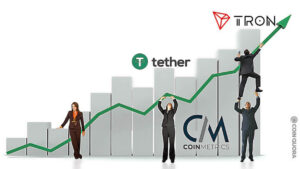
- Facebook announced its Metaverse rebranding.
- Metaverse deemed as one of the future aspects of decentralization.
- Crypter to launch an engage-to-earn rewards system.
Mark Zuckerberg made waves when he announced Facebook’s rebrand and its wider goal of helping bring the metaverse, a convergence of physical and virtual reality, to life. But the metaverse goes far beyond the Facebook CEO’s plans.
The concept of the metaversewas coined back in Neal Stephenson’s 1992 novel Snow Crash. Even aside from Facebook, a number of companies have been busy embarking on metaverse-related endeavors over the last few years. Tim Sweeney, CEO of Epic Games,even commented in January 2021 about some of the particular needed elements of an open metaverse.
Venture capitalist Matthew Ball layed out several key components of the metaverse in a January 2020 essay. In Ball’s eyes, the ecosystem would need to span across the physical and virtual worlds, feature a full-fledged economy, and offer interoperability so goods could be moved to different areas of the metaverse.
While the concept of the metaverse has enjoyed rapt attention across the media lately, what companies like Facebook are also understanding is how the tides are shifting towards decentralized communication and social media platforms in general.
The metaverse is simply one aspect of a future where decentralization rules the day and conversations can be truly ‘social’ in nature without one company or organization exerting control over discussions. In August 2021, Twitter’s decentralized “bluesky” social media groupappointed crypto developer Jay Graber as project lead to propel the organization as it embarks to build a decentralized social ecosystem.
Decentralized social networks empower users with more control and autonomy over what they say. They can also allow users to collect with other servers so they can engage across platforms in contrast to traditional social media entities who have no cross-platform alignment.
Crypter is one example of how decentralized social media continues to make waves. As the first of its kind to launch an engage-to-earn rewards system, Crypter users earn by just interacting with others on the platform. The Facebook-like social media tool lets crypto fans share their gains and losses, build private groups, communicate with other users, and safely research new investments as limitations are in place to prevent the promotion of scam projects and fraudulent advertisements.
Some social media platforms have cracked down on crypto-related content in general. Users on some traditional platforms also express wariness about discussing cryptocurrency due to concerns about family members or friends (especially those skeptical of digital assets) chiming in and ruining what could be fruitful discussions.
These sort of concerns underscore the importance of decentralized social networks and crypto-friendly spaces and communities within the metaverse. Projects like Crypter stand as a benefit to the cryptocurrency community as decentralization continues to grow in popularity and scope.
- 2020
- 2021
- announced
- Assets
- AUGUST
- build
- ceo
- Communication
- Communities
- community
- Companies
- company
- content
- continues
- conversations
- cross-platform
- crypto
- cryptocurrency
- day
- Decentralization
- decentralized
- Developer
- digital
- Digital Assets
- economy
- ecosystem
- empower
- Epic Games
- family
- Feature
- First
- future
- Games
- General
- goods
- Grow
- How
- HTTPS
- Interoperability
- Investments
- IT
- JavaScript
- Key
- launch
- lead
- Media
- Members
- Metaverse
- networks
- offer
- open
- organization
- Other
- Others
- physical
- platform
- Platforms
- plugin
- private
- project
- projects
- promotion
- Reality
- rebranding
- research
- Rewards
- rules
- Scam
- Share
- So
- Social
- social media
- social media platforms
- social networks
- system
- The Future
- The Metaverse
- Tim Sweeney
- users
- Virtual
- Virtual reality
- waves
- WHO
- within
- years









